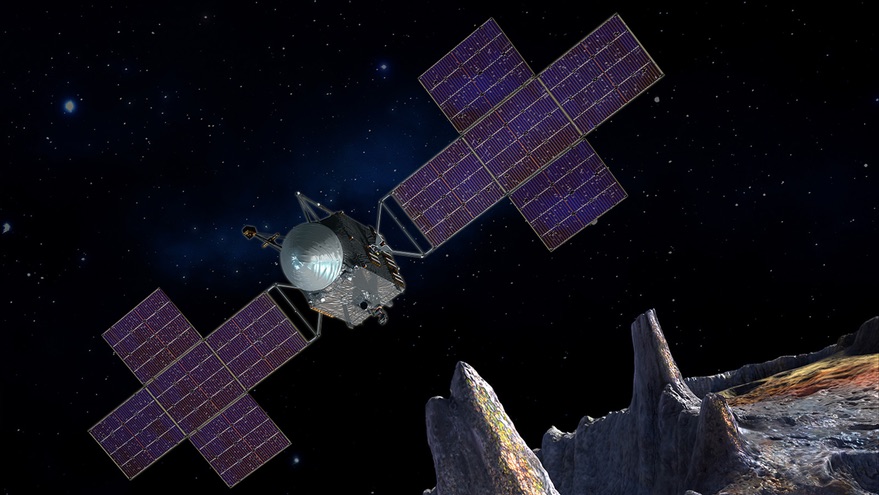WASHINGTON — NASA’s Psyche asteroid mission will not launch this year as previously planned after the agency concluded there was not enough time to complete testing of the spacecraft’s software before its launch window closes.
In a briefing held June 24 on just a few hours’ notice, agency officials said the mission did not have enough time to test guidance, navigation and control (GNC) software on the spacecraft before its launch window closes Oct. 11. NASA had already delayed the launch from Aug. 1 because of the software testing issue.
“Following exhaustive analysis, augmentation of resources and efforts to rescope or rephase functionality, the project and JPL have concluded that Psyche does not have a path to launch with acceptable risk in the 2022 opportunity,” said Lori Glaze, director of NASA’s planetary science division.
Project officials said the problem was not with the GNC software itself but rather a testbed used to test that software by simulating the spacecraft. “The testbed is basically a splayed-out simulation of the actual spacecraft. It’s a combination of hardware and software,” said Henry Stone, Psyche project manager at the Jet Propulsion Laboratory. “It’s intended to make a replica of the flight system onto which you can then run the software to test out all of the system behaviors.”
The testbed is the responsibility of JPL, he said, but also includes components provided by Maxar, the prime contractor for the Psyche spacecraft. “We had to merge that portion of simulators and test equipment with the portion at JPL to create the overall system. We ran into some issues there.” Maxar did not immediately respond to a request for comment regarding its role on the Psyche testbed.
Lindy Elkins-Tanton, principal investigator for Psyche at Arizona State University, said development of the GNC software was running behind schedule last year. By early this year, the project knew the testbed was also behind schedule. That testbed is now working, but too late to test the software in time for a launch this fall. “Only recently did it become clear that time would just be too tight to reach the 2022 launch period,” she said.
“We haven’t had this exact problem before, especially the unique challenge of the testbed environment,” Laurie Leshin, director of JPL, said. She estimated it would have taken “weeks to months” to complete the testing.
Glaze said NASA just made the decision not to launch Psyche this year, and thus has not made firm plans for the mission’s future. She said the agency will commission an independent review of the mission to examine options and associated costs for continuing it. That will support a formal review to either continue or terminate the mission.
“I’d like to get that done as soon as we can,” she said of that continuation review, but didn’t give a firm schedule for doing so, citing the need to assess “complex trajectories” for future launch opportunities.
Elkins-Tanton said there are launch windows for the mission in July and September next year, but didn’t state how long it would take for Psyche to reach its destination, a metallic main-belt asteroid also called Psyche, if it launches then. A launch in 2022 would have allowed the spacecraft to reach the asteroid in 2026.
Leshin noted that Psyche’s use of electric propulsion gives mission designers some flexibility in planning trajectories for the spacecraft. “There are good-looking opportunities in ’23 that get us there before the end of the decade.”
That review will also address the additional cost caused by the delay. An assessment of NASA projects released by the Government Accountability Office June 22 noted that Psyche’s cost was $965.6 million, 3.1% below its baseline cost commitment of $996.4 million. However, that report stated that the mission’s cost reserves were lower than projected and that even before this software testing issue “the project anticipated that additional funding would be necessary to meet its planned launch readiness date.”
Glaze said the review will look at how the additional costs of Psyche could affect other planetary science missions at the agency, in particular the Discovery line of cost-capped missions that includes Psyche. She did not elaborate on potential implications for Discovery those missions, but they could affect two Venus missions, DAVINCI+ and VERITAS, selected for development by NASA in the Discovery program a year ago.
Psyche’s delay will also affect Janus, a rideshare mission launching with Psyche designed to fly by binary asteroids. The earlier delay of Psyche’s launch from Aug. 1 to no earlier than Sept. 20 already disrupted that mission, preventing it from performing the Earth flybys it needed to reach its original destinations.
Glaze said that NASA’s focus for now is on figuring out a new plan for Psyche. “Once we know that, we will be able to think a little more completely about what the path forward for Janus will look like,” she said. The same is true, she added, for the Deep Space Optical Communications technology demonstration installed on Psyche itself, an experiment to test high-bandwidth laser communications.
“We will do what’s needed, and we will work with NASA on all options moving forward,” Elkins-Tanton said.
